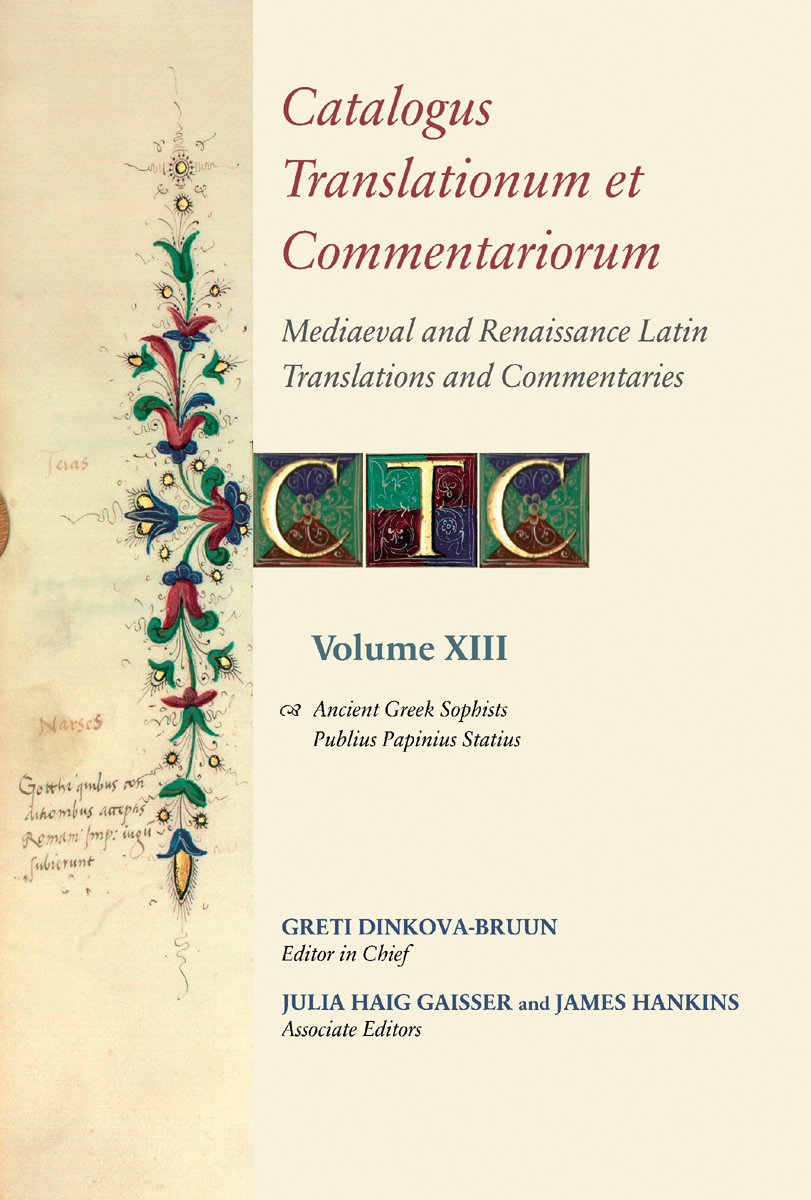
Catalogus Translationum et Commentariorum, Volume XIII
Mediaeval and Renaissance Latin Translations and Commentaries: Annotated Lists and Guides
CTC 13. 2020. xl, 364 pp. ISBN 978-0-88844-953-5 • Cloth • $95
Volume 13 contains two articles, both major contributions of considerable length: the first on the ancient Greek sophists, the second on the Roman poet Publius Papinius Statius.
Founded in 1946 by Paul Oskar Kristeller, the Catalogus Translationum et Commentariorum has become an indispensable research tool for scholars interested in the history of the classical tradition in the West during the Middle Ages and the Renaissance. Each article treats a separate classical author, beginning with a detailed essay on the author’s reception from antiquity to A.D. 1600 and, in some cases, even up to the present day. This ‘Fortuna’ is followed by a comprehensive list both of manuscript and printed commentaries on each Latin author and, in the case of Greek authors, a list of Latin translations as well.
Since the publication of the first volume in 1960, the Catalogus has published articles on nearly a hundred classical authors, with dozens more in active preparation. The project boasts an inter national team of contributors from fourteen countries in Europe and North America. Given the ever-growing interest in the history of classical reception across departments of English, European languages, and comparative literature, the foundational scholarship that is the hallmark of the CTC has become more vital than ever to research in the humanities.
Contents
Preface, by Greti Dinkova-Bruun • vii
Preface to Volume I, by Paul Oskar Kristeller • xv
General Bibliography • xxiii
Abbreviations • xxxvii
Greek Authors
Ancient Greek Sophists, by Eric M. MacPhail (Indiana University) • 1
Latin Authors
Publius Papinius Statius, by Harald Anderson (Reston, VA, USA) • 53
Index of Ancient and Medieval Authors and Works • 347
Index of Mythological Figures • 351
Index of Manuscripts • 353
Index of Translators and Commentators • 360
Index of Ancient Authors Treated in Volumes I–XI and XIII • 363
Editors
Greti Dinkova-Bruun is a Fellow and Librarian of the Pontifical Institute of Mediaeval Studies, Toronto. She has edited Alexander Ashby’s Opera Poetica for the Corpus Christianorum Continuatio Mediaevalis (2004) and The Ancestry of Jesus: Excerpts from “Liber Gene rationis Iesu Christi Filii Dauid Filii Abraham” for Toronto Medieval Latin Texts (2005). Her numerous articles have appeared in Mediaeval Studies, Viator, Sacris Erudiri, Mittellateinisches Jahrbuch, and Archives d’histoire doctrinale et littéraire du Moyen Âge, among other journals.
Julia Haig Gaisser is Eugenia Chase Guild Professor Emerita in the Humanities and Professor Emerita of Latin at Bryn Mawr College. Her article on Catullus appeared in CTC 7 in 1992. She is the author of Catullus and His Renaissance Readers (1993), The Fortunes of Apuleius and the “Golden Ass”: A Study in Transmission and Reception (2008), and Catullus (2009); she is also the editor and translator of Pierio Valeriano on the Ill Fortune of Learned Men: A Renaissance Humanist and His World (1999) and Giovanni Giovanio Pontano’s Dialogues: Charon and Antonius (2012).
James Hankins is Professor of History at Harvard University and founder and general editor of the I Tatti Renaissance Library, published by Harvard University Press. He is the author of, most recently, Virtue Politics: Soulcraft and Statecraft in Renaissance Italy (2019) and Plato in the Italian Renaissance (1990; Italian translation, 2009), and editor of The Cambridge Companion to Renaissance Philosophy (2007) and (with Fabrizio Meroi) The Rebirth of Platonic Theology (2013), as well as editor and translator of Leonardo Bruni’s History of the Florentine People (2001–2007) and editor of Marsilio Ficino’s Platonic Theology (2001–2006).
Endorsement
“From the publication of its first volume in 1960, the Catalogus Translationum et Commentariorum has proved itself an indispensable resource for students of the afterlife of classical literature. In clear yet learned articles, its contributors trace the reception of particular authors or texts, especially in the Renaissance and early modern period, taking into account both manuscripts and early printed editions. This thirteenth installment, ably edited by Greti Dinkova-Bruun, includes two new contributions. Eric MacPhail covers the Greek Sophists, including Gorgias, Antiphon, and Critias, as well as Prodicus’s influential parable on the Choice of Hercules. The majority of the volume consists of Harald Anderson’s magisterial treatment of Statius, surveying the vast reception of his Thebaid and unfinished Achilleid, joined in the Renaissance by the newly rediscovered Silvae. As always, the articles are complemented by comprehensive indices, including for the first time an index of mythological figures. Judiciously laying out what is known and providing a vital stimulus to future work, this volume is a worthy addition to its distinguished predecessors.” — Gregory Hays, University of Virginia
Ordering
Customers in North America please order through University of Toronto Press Distribution by phone (1-800-565-9523) or by email (utpbooks@utpress.utoronto.ca). If you would like to order through UTP Distribution using another method such as mail or fax, please click here for a full list of contact and ordering methods. PIMS books are also available on Amazon.ca (for Canadian customers) and Amazon.com (for customers in the U.S.).
Customers outside North America please order through Brepols Publishers. PIMS books are available through the Brepols online catalogue.


